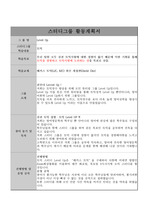국제결혼가정 내 갈등에 대한 질적 사례 탐구 ― 캐나다인 결혼이주민 남성의 가정을 중심으로 ―
* 본 문서는 배포용으로 복사 및 편집이 불가합니다.
서지정보
ㆍ발행기관 : 한국교육사회학회
ㆍ수록지정보 : 교육사회학연구 / 23권 / 3호
ㆍ저자명 : 전은희
ㆍ저자명 : 전은희
목차
Ⅰ. 서론Ⅱ. 국제결혼가정 내 갈등: 캐나다인 결혼이주민 남성의 가정을
중심으로
Ⅲ. 해석 및 논의
참고문헌
ABSTRACT
한국어 초록
이 연구에서는 캐나다인 결혼이주민 남성이 혹한 국제결혼가정을 통해 구성원들 간의 갈등과 그 갈등의 함의는 무엇인지 질적 접근에 기초하여 살펴보았다. 연구 결과를 보면, 해당
가정의 구성원들은 일련의 사회적 갈등에 처해 있었다. 이주민 남성의 경우 외국인이라는
신분으로 인해 직업적 상황이 불안정하였으며, 추방의 위기 등 제도적인 불편에 항시적으로
노출되어 있었다. 또 학위라는 개인적 과업을 달성하기 위해 고국 및 서구국가들과 연결을
유지하고 있었으며, 가족을 제외하고서는 한국 내의 지속적인 사회적 관계라고 할 것이 발
견되지 않았다. 배우자 여성과 그 자녀는 취업이나 거주, 취학 등 한국사회에서 살아가는데
아무런 제도적 불편이 없었으며 또 직장과 학교, 학원 등에서 다양한 사회적 관계를 맺으며
살아가고 있었다. 다음으로, 해당 가정의 구성원들은 언어 문화적 갈등을 경험하고 있었다.
10년이 넘는 체류에도 이주민 남성은 한국어를 습득하지 못한 채 영어만을 사용하고 있었
다. 또 기존의 서구식 가치관과 생활방식, 식문화를 고수하고 있었으며 가족들에게도 일정
부분 이를 강요, 요구하고 있었다. 또 그는 아동 청소나 과도한 학업 등 한국 학교의 관행을
받아들이지 못하고 있었으며 이로 인해 배우자와 갈등, 충돌하고 있었다. 한국말이 자유로운
자녀들은 영어만을 사용하고 한국적 문화를 이해하지 못하는 아버지와 부딪히고 있었으며,
배우자는 그러한 갈등적 상황들을 중재하는 동시에 이주민 남성에게 반복적으로 한국의 문
화에 대해 설명하고 있었다. 끝으로 해당 가정 구성원들 사이에서는 교육과 관련한 일련의
갈등이 발견되고 있었다. 이주민 아버지는 자신의 서구적, 종교적 가치관에 기초하여 자녀들
을 양육하고자 하였다. 자신들의 일상을 엄격히 관리 통제하면서 교우관계나 기타 외부 활
동을 제한하고자 하는 아버지의 태도는 사춘기에 접어드는 자녀에게 부담과 불만이 되고 있
었으며, 아버지의 가치관과 훈육방식에 반발하고 있었다. 또 그 배우자 여성은 자녀 교육과
관련하여 체벌과 선행학습 등 한국적 관행을 이해하지 못하고 사교육을 혐오하는 남편과 갈
등하고 있었으며, 한편으로는 한국적 관행을 따르면서 다른 한편으로는 남편에게 이를 은폐
하고 있었다.
영어 초록
This study aims to understand the implications of conflicts in a paternal-intermarriage family.For this purpose, I selected a paternal-intermarriage family whose marital-immigrant man was
from Canada with Korean wife and three children and conducted a qualitative case-study. The
results of this study are as follows: First, there was some social conflicts among the family
members. The marital-immigrant man was still legally a foreigner, so that he was forced to face
with some institutional restrictions for employment, social-welfare and residence in Korea. He
not only wanted to continue his study abroad except Korea, but also hardly any social
relationships with native Koreans around himself, which prevented him from considering Korea
as a permanent residential place. However, his wife and children were born and raised up in
Korea which had made them Korean both legally and socially. Compared to their husband and
farther, with abundant intimate social networks, they have no formal barriers to live and enjoy
legal rights as citizens in Korea.
Next, there was found linguistic cultural conflicts among the family members. The
marital-immigrant man, although having resided beyond ten years, hardly learned to speak
Korean and sticked to his own homeland culture and value system. For example, he highly
appreciated the idea of privacy, so that he demanded other family who have been accustomed
to the Korean way of relationship-making with friends and neighbours follow his standard on
privacy. Furthermore, he could not understand and accept customary practices of Korean schools
such as students-cleaning, excessive study and frequent tests, which repeatedly made his wife
explain on those issues. The other family also felt so uncomfortable with the difficulty of
communication of their father that they sometimes made their own interactional space by talking
to each other in Korean. However, when they fail to do this successfully, there were some
arguments and disagreement among the family members.
Finally, there was an disciplinal or educational conflicts among family members. The
marital-immigrant man tried to rear his kids based on his religious and western way of
thinking. For instance, he not only managed to check every movements of his kids and keep a
watch on them, but also made an effort to restrict their social activities and group lives related
with their friends or schools. The kids, however, opposed to his rigid way of bringing-up and
tried to escape from his sphere of influence. In addition, the spouse of the marital-immigrant
man did not agree with the attitude of her husband who could not accept habitual practices of
Korean parents such as corporal punishment, preference for private education and curriculum
acceleration. On the contrary, she felt unsatisfaction with his attitude and tried to raise her
children based on her own cultural, educational ideas beyond eyeshot of her husband,
sometimes using physical punishment for her kids, which resulted casual dispute or quarrel
between her and her husband.




























